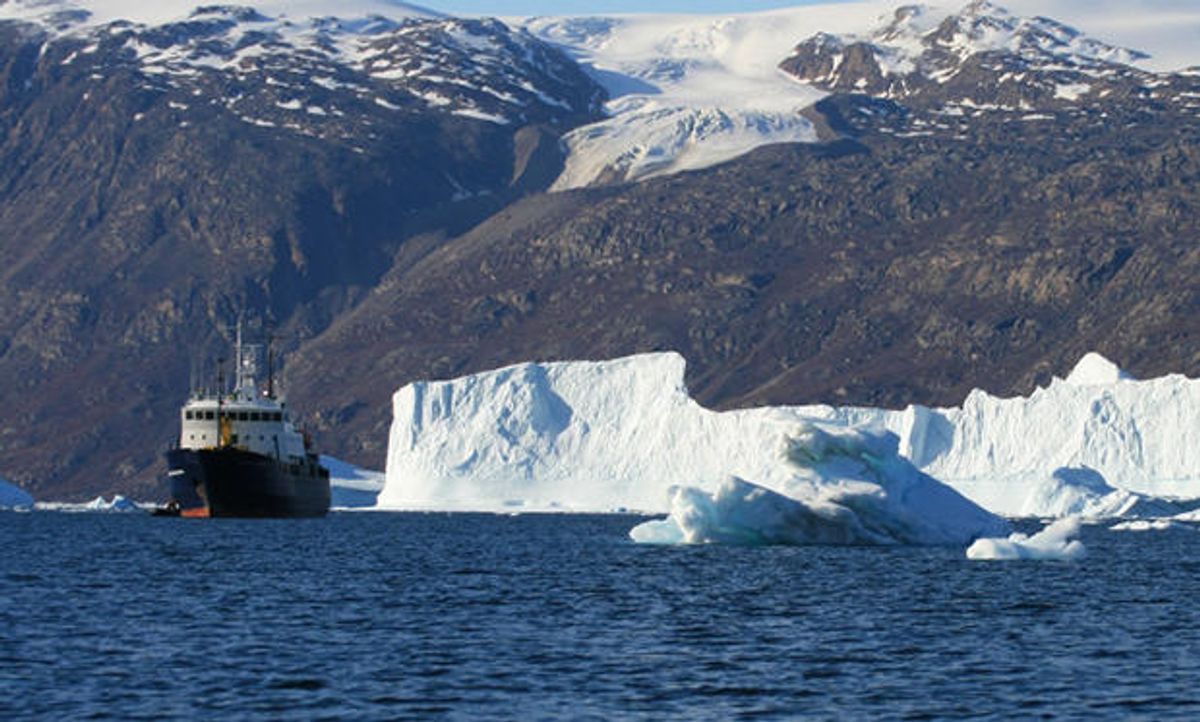The Intergovernmental Panel on Climate Change (IPPC) released a new assessment of climate science this morning, its fifth comprehensive evaluation of the basic physics. In light of the controversies that dogged its work and the doings of some major contributors—an error that found its way into the last assessment concerning the rates at which Himalayan glaciers are melting; the "climategate" kerfuffle over leaked e-mails—perhaps the most significant aspect of the new report is simply its reaffirmation of previous findings.
Of course, the report is being spun slightly differently depending on the ideological proclivities of publishers and, no doubt, the personal interests and obsessions of particular writers. The Wall Street Journal, in its treatment today, stresses a moderate lowering of the IPCC's projected warming range in this century by comparison with 1850-1900: to 1.5-4 degrees celsius (not 2 degrees, as the Journal misleadingly put it), from 2-4.5 °C previously. The New York Times mentions the IPCC's lowering its estimate of the warming to be expected from a doubling of greenhouse gas concentration, to 2.7-8.1 degrees from 3.6-8.1, but it emphasizes the limit put on the amount of CO2 that can be spewed into the atmosphere if warming is to be held at 3.6 °C: That limit is 1 trillion tons of carbon in toto—roughly half of which has already been emitted since the beginning of the industrial revolution in 1750, with the second half due to be emitted by 2040 if business continues as usual.
The IPCC assessment, even in the 36-page summary for policymakers, does not make for easy reading and leaves a good deal open to interpretation. Almost every statement is so carefully hedged with probability estimates--"very likely," "likely," virtually certain," "might," "cannot be made with confidence," "very unlikely," and so on--that one easily loses sight of the substantive statements actually being made.
Still, some of the most dramatic statements in the report are made flatly, without any qualification whatsoever. Atmospheric concentrations of carbon dioxide, methane, and nitrous oxide have all increased sharply since 1750 and now exceed pre-industrial levels by about 40 percent, 150 percent, and 20 percent respectively. Indeed, their levels "now substantially exceed the highest concentrations recorded in ice cores during the past 800,000 years.”
The IPCC estimates that the average rate of ice loss from glaciers around the world was 275 gigatons per year in 1993-2009, as compared to 226 Gt/yr in the longer 1971-2009 period; Greenland ice sheet melting has "very likely" increased "substantially" to 215 Gt/yr in 2002-2011 from 34 Gt/yr in 1992-2001. Antarctic ices loss "likely" went form 30 Gt/yr in 1992-2001 to 147 Gt/yr in 2002-11.
The IPCC minimizes the significance of slowed warming registered in the last ten years, saying it is well within the bound of normal decadal variability. As for future warming (treated in Section E1 on p. 15 of the summary for policymakers), it is likely to exceed 1.5 or 2 °C in various modeled scenarios, is "unlikely" to exceed 4 °C in all but one of the models, but is "about as likely as not" to exceed 4 °C in the most pessimistic model.
Considering that estimated warming has been in the range of 1.5-4.5 °C since the dawn of computerized climate modeling, one might wonder why so many scientists have gone to the trouble, at considerable expense, of once again subjecting projections to every reasonable kind of probing they can think of only to conclude the original estimates were about right all along. And indeed some reputable authorities are wondering exactly that. In an editorial last week, Nature magazine suggested that it is time for the IPCC to stop doing its regular, comprehensive assessments and instead do focused reports on topics of urgent concern, like the report it issued last year on weather extremes.
I'm tempted to agree. The repetition of so many well-known findings, together with the endless qualification of each finding in terms of probability, tends to deaden rather than awaken interest. Then too there is the inherent caution of the IPCC, given that all reports must be produced by consensus, a conservatism that no doubt was heightened this time around by the climate mini-scandals of the past few years. But what if there were suddenly to be an abrupt change in mainstream assessment of climate prospects, either for better or worse? In the absence of the IPCC's regular assessments, there would be no authoritative and generally respected procedure for validating the change and alerting policymakers to its implications.
Photo: iStockPhoto



